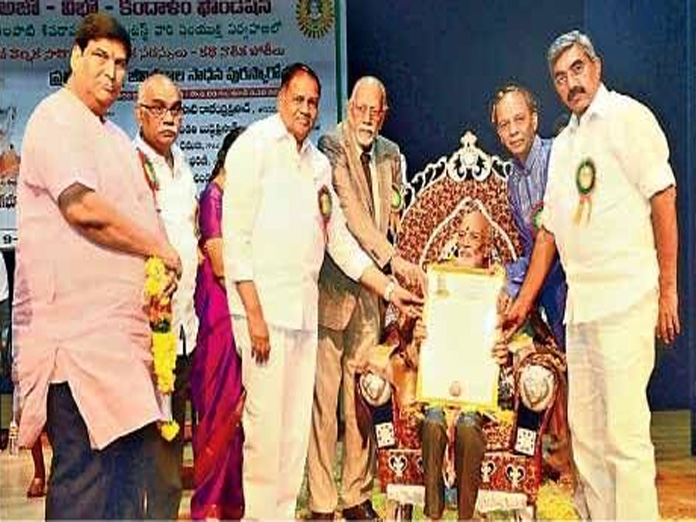The great man of theatre!

When he was receiving the AJOVIBHO Lifetime Achievement Honour, a week back, no one knew that death hovered in the background in a quiet unobtrusive manner behind Dr Modali Nagabhushana Sarma But this turned true, that a genius had slipped away into the folds of time In the passing away of Dr Modali Nagabhushana Sarma, we lost a quintessential theatre grammarian, and an experimental aesthetic,
When he was receiving the ‘AJOVIBHO Lifetime Achievement Honour’, a week back, no one knew that death hovered in the background in a quiet unobtrusive manner behind Dr Modali Nagabhushana Sarma. But this turned true, that a genius had slipped away into the folds of time. In the passing away of Dr Modali Nagabhushana Sarma, we lost a quintessential theatre grammarian, and an experimental aesthetic, who did his Masters from Illinois University.
And this urge to understand the horizon of East and West remained aloft in his word and deed. In his official capacities as the Head of the Theatre Arts, Osmania University, he furrowed ways to bring back the glory of performing arts as well. Under his stewardship, OU has held three national festivals of Kuchipudi, in association with Central Sangeetha and Nataka Akademi.
He brought out special numbers of ‘Nartanam’, a periodical he edited for 12 long years, wherein focus issues on theatre stalwarts like Bellary Raghava, Sthanam Narasimha Rao, and Nataraja Ramakrishna were brought out besides many on the cultural richness of south Indian performing arts. His name was mentioned as one of the Editors/Contributors in the Oxford Companion to theatre and performances, brought out in 2010 by Dennis Kennedy.
He had the distinction of directing his own plays, and in his lifetime, he had not directed any plays written by others. Although he acted in many, including his debut role of Madhuravani in ‘Kanyasulkam’ at the age of 18 in a college at Bandar (Machilipatnam) much to the initial dismay of his father, but being a ‘great father’ (Young Modali said ‘Goppa Nannagaru’) he never discouraged the boy, and changed his track from that of mathematics to English in his graduation.
Thus, the young actor and burgeoning thespian in Modali Nagabhushana Sarma got a fillip and his interests in learning about the theatre after his post-graduation took him to the Illinois University in the USA, where he did his PhD on American Theatre.
And this had opened the window to him to understand the Western theatre and its principals of evolution. Being a positive appropriator of the wisdom from the plays; his thirst resulted in translation of many plays from the occident i.e. ‘Macbeth’, ‘Waiting for Godot’, ‘King Oedipus’, ‘Antigone’, ‘Emperor Jones’, ‘Enemy of the People’, ‘Doll’s House’, etc. He prepared the scripts and made them ready for presentation on the stage. King Oedipus was presented in environmental/experimental theatre in a stage construction of elevated stairs at the Osmania Campus.
He did research into the beginnings of Telugu play as well and sided with the proposition that Dharamavarapu Ramakrishnamacharyulu, the playwright and actor from Bellary was the Telugu first playwright, and to this extent, he produced a book also. This remains a point of dispute because, in terming it Telugu Natakamu, scholars like Dr Sarma, do not include the modernity of the theme and dialogic vernacular, which is crucial to judge the contemporaneity of a specific play.
Thus, the recognition of being a first playwright in Telugu, is a debate between Kandukuri Veeresalingam’s ‘Vyavahara Dharma Bodhini, in 1886 (of which the script is available and intact), which is relegated to second place by scholars like Dr Sarma, who favour the untraceable and now extinct ‘Unmatta Rama Prekshanamu’ the work of Dharamavaram Ramakrishnamacharyulu. Kandukuri was consistent in his writings which criticised the social orthodoxy in plays of farcical nature like ‘Vyavahara Dharma Bodhini’, and ‘Brahma Vivahamu’ are robust in vernacular dialogic pattern and it dealt with social problems of the day.
His work on a Century of Telugu Literature – Gandhiji’s influence is a vast observation and critique of several writings that saw the light in the independence movement in Telugu land. His yet another work ‘Nataka Silpamu’ (The craft of theatre) is a landmark study into the concepts of rendering the play to the stage, understanding its ground rules and going on innovating as the context demands.
Acharya Modali Nagabhushana Sarma, authored books in English, on drama and theatre in the Telugu region, and thus introduced the Telugu theatre to the nation, and to the world. His books in English include ‘Bellary Raghava’, ‘The Folk Performing Arts of Andhra Pradesh’, ‘The Shadow of Puppet Theatre of Andhra’, ‘A History of the Surabhi Theatres’.
His scholarly production of books which he edited are ‘Telugu Navalaa Vikasam’, ‘Sthanam Narasimha Rao’, ‘Natajeevana Prasthanam’, ‘Kalyanam Raghuramayya Jeevitham’, ‘Kanyasulkam – Noorella Samalochanam’, ‘Natyambujamu – Natyasokamu’, ‘Acharya Atreya – Telugu Nataka Rangam’ and he also edited the omnibus on Dharmavaram Ramakrishnamacharyulu complete plays.
In recognition of his monumental works, many honours came his way. Tagore Academy Ratna Award, NTR Award for Theatre excellence, recognition from Telugu University, TANA Award, besides honours by many dramatic associations in Karnataka and Andhra Pradesh.
He directed plays in Sanskrit, English and Telugu. Dr Sarma had valued the folk arts as well and endeavoured to trace the cultural complexities of society, through its literature and art.
His overhauling work approach is difficult to emulate, but one can hope on the present and future generations to appreciate and further develop the quest of Dr Sarma. That only is a real tribute to this Vindhya mountain, a landmark all will cherish, in the theatric geography of the nation.

